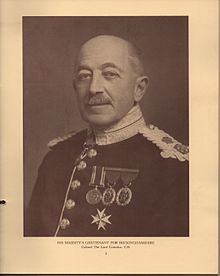The Lord Cottesloe | |
|---|---|
 Photograph of Lord Cottesloe from the 1938 Slough Charter of Incorporation | |
| Member of the House of Lords | |
Lord Temporal | |
| as a hereditary peer 13 April 1918 – 9 July 1956 | |
| Preceded by | Thomas Fremantle, 2nd Baron Cottesloe |
| Succeeded by | John Fremantle, 4th Baron Cottesloe |
| Personal details | |
| Born | Thomas Francis Fremantle 5 February 1862 |
| Died | 9 July 1956 (aged 94) Swanbourne, Buckinghamshire, England |
| Spouse |
Florence Tapling
(m. 1896; died 1956) |
| Relatives |
|
| Education | |
Thomas Francis Fremantle, 3rd Baron Cottesloe, 4th Baron Fremantle CB VD TD DL JP (5 February 1862 – 9 July 1956) was a British peer and rifle shooter. Regarded among the foremost marksmen of his day, he competed for Great Britain in the 1908 Summer Olympics, and captained Great Britain in several international matches. He was also a long-time member of the English Eight Club, shooting, coaching and captaining England in the Elcho match for a total of more than sixty years.
The eldest son of Thomas Fremantle, 2nd Baron Cottesloe, Fremantle was educated at Eton College, where he showed an early aptitude for shooting, and at Balliol College, Oxford. He first made the final of the Queen's Prize, the most prestigious competition in British rifle shooting, while still an undergraduate. In 1885, the year after he left Oxford, he first represented England in the Elcho, and he went on to captain Great Britain in the International Rifle Match, the Empire Match and the Palma Match. He was also prominent in the administration of British shooting, becoming assistant secretary to the British National Rifle Association (NRA) in 1889 and helping to oversee the NRA's move to Bisley Camp in Surrey. He served as the NRA's chairman between 1931 and 1939.
Fremantle became an officer in the Volunteer Force in 1881. He served as a volunteer aide-de-camp to Garnet Wolseley, the Commander-in-Chief of the Forces, and between 1900 and 1903 as an Assistant Private Secretary to his cousin St John Brodrick, the Secretary of State for War. He conducted research into ballistics alongside his mentor Henry St John Halford and the engineers William Ellis Metford and Arthur Mallock, and was regarded as an authority on the history and design of rifles, on which he published several books. He was made an associate member of the Board of Ordnance and chairman of the War Office Small Arms Committee. During the First World War, he was head of the Territorial Association, which represented the army's reserve battalions.
Fremantle's eldest son, Thomas, was killed in the First World War; upon his death in 1956, Fremantle's title passed to his second son, John. Among his four daughters was Margaret Jennings, a researcher into penicillin under Howard Florey. He donated several of the NRA's trophies and left the association £1,000 (equivalent to £31,526 in 2023) for the promotion of shooting competitions to support the development of long-range rifles.